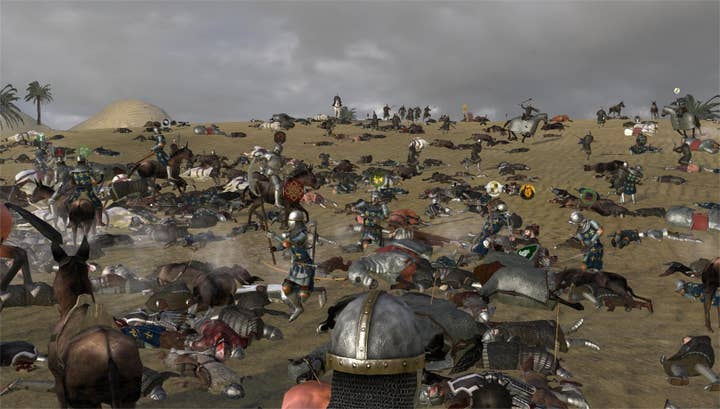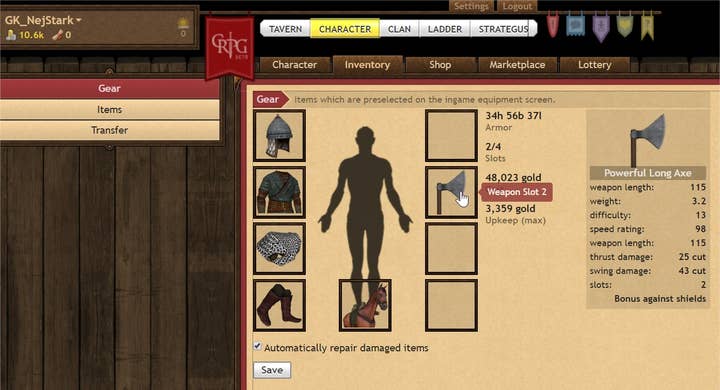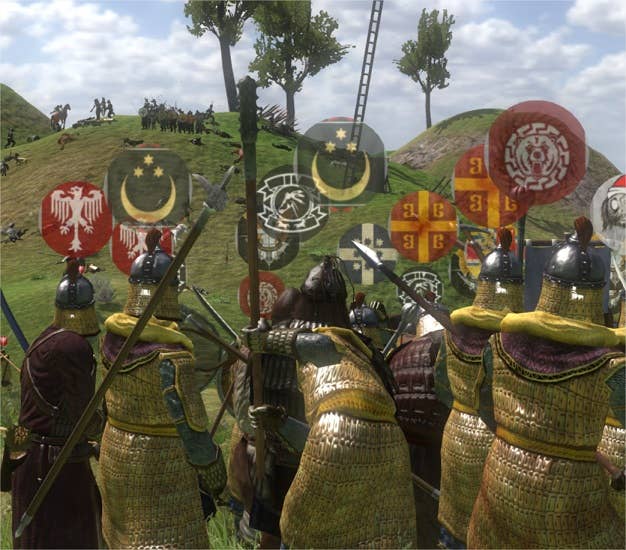The transcendent appeal of Mount & Blade: Warband
Why I Love: The degree of difficulty for dev and player alike got John Nejady interested in TaleWorlds' medieval battle game, but the community he found made it something more
Why I Love is a series of guest editorials on GamesIndustry.biz intended to showcase the ways in which game developers appreciate each other's work. This entry was contributed by John Nejady, technical producer at Coconut Lizard and veteran of Sumo Digital, Ubisoft, and CCP Games.
Mount & Blade: Warband found me at an odd time of my life. I was around 25 years old, working as crunchy functionality QA on a driving game in a medium-large team. I came across it how I suppose lots of us discovered games back then: Steam popup notifications. "*Friend who normally plays really difficult games* has started playing Mount & Blade: Warband." Many times, over and over, for weeks.
I eventually cracked and asked him what it was all about. "This is the best game ever made," he opened, "but you need the cRPG mod to really play it."
What followed was several years of learning, community, discovery, and of course, enjoyment, which transcend anything I have personally experienced from a video game before or since.
Technically absurd, in the best possible way
The game I was working on at the time was to launch mainly on console, and as with most pre-launch console games with simultaneous multiplayer, various different teams and individuals were working tirelessly to allow us to support a higher number of players when we shipped. Was it going to be six, eight, maybe 12?!? Don't be ridiculous. Anything above 10 was a pipedream.
The first thing that struck me when I first joined a Warband server -- other than how woefully unequipped my peasant seemed to be compared to other players -- was the sheer volume of people fighting in the same battle. Was it 50 people? 70, maybe?
The first battle I joined contained around 120 players.
All were in unique outfits and equipment, some in clans holding shields all adorned with beautiful (player-created) heraldry, some operating silently with crossbows from bushes, some riding sleek destriers and plated coursers past lines of archers whilst shouting voice commands in order to draw fire from the main body of their forces infantry.
Some longbowmen opted to carry two full quivers of bodkin arrows to pierce armour at the expense of mobility, knowing the skilled pikeman by their side was one of the best in the game, and would never let them be charged down by cavalry, or outflanked by crossbow-carrying monks coming through the undergrowth. Others opted for a more lightweight option; a short bow and single quiver of simple barbed arrows would aid mobility, but you'd run out of arrows sooner. But that's OK; in Warband, arrows that didn't find their mark would stick into the ground, or rocks, or trees, or shields. Take fire from that longbowman with Bodkins, and you could pull his own arrow out of a tree and fire it back at him, hopefully ending his future contributions to this battle.
150 peasants on foot, heraldic mounted knights, byzantine halberdiers, nordic axe-throwers, mongol horse archers, and monkish daggermen all firing, collecting, slicing, stabbing, blocking, kicking, bashing, and bludgeoning their way through a battlefield in various degrees of coordinated and chaotic reverie combined to make Warband cRPG mod battles the most absurd, technically impressive and wonderful sights I have ever beheld in a video game.

On top of this, damage is dealt with physics calculations taken into mind. If you are riding towards a target and hit it with a bow shot, you will do more damage than if you were riding away from it. If you slash a person whilst side-stepped and rotating to make your blade move faster, you will do more damage than just facing them and swinging.
The original Mount & Blade that started all of this was made as a hobby project by a married Turkish couple under the studio name TaleWorlds. They released Mount & Blade which was a hit, and used that success and money to grow a small team to make Warband and from the success of Warband are developing the next game in the series Bannerlord, for which I have high hopes.
The mod I played was the cRPG mod, which added a wide range of features like online character persistence, an online economy which you could use to equip your character in a web-browser, UGC and clan features, unique items for clans to use, and a longer term strategy MMO element named 'Strategus' in which very organised clans could fight over a continent sized map over a series of months. The team who made that mod, Donkey Crew, went on to run a failed Kickstarter for their own game (Melee: Battlegrounds) which didn't go well, but are now developing another game (Last Oasis) for which I wish them well.

At the time I knew these teams were achieving technical greatness, but now that years have gone by and I've shipped more games, gained more and more experience with more and more teams, I'm even more astonished at what they achieved.
It took me five weeks to kill anybody, and that's OK
There was a reason, it turned out, that *Friend who normally plays really difficult games* was playing a lot of Warband, and not most others. In most prominent third-person games with melee combat, the player can mash buttons in whichever way they choose and take a back seat while the code and animation teams at whichever AAA studio made the game step in to show us their magnum opus. A wild flurry of Player 1's uninformed fingers can become a poetic and deadly dance of blades and limbs befitting the era, location, and creative direction of the game, while the AI stands back, waiting for their moment to strike. Not so in Warband.
When you press the swing button in Warband, you do so in the direction that you are moving your mouse; Mouse left and left-click and you will charge a left swing, forward and you will ready an overhead slash with a blade, or a bonk over the head with a bludgeoning weapon. In order to not be hit by any of these, those without shields must ready a block in the appropriate direction in order to not be stabbed, sliced or bludgeoned. Those with shields had better find a way out of the threat, as they'd eventually be broken, more quickly by those with axes. This level of accuracy in combat -- compounded by the multiplayer setting -- demands a high level of skill and cool-headedness from players.
In Battles, where two teams are pitted against each-other and there are no respawns, those who die are left to spectate the rest of the match freely. Matches would often end in an epic 1-on-1 duel, where the pride of one clan would face off against the pride of another, each feinting, parrying, kicking and slashing at the other. Even more epic endings would see the pride of one clan facing off against ten other players, with the lone player gradually picking off the opponents who in an effort to end the fight quickly and take the glory for themselves, would pile in, perhaps hindering, and sometimes hitting and killing their own teammates.
Through some cruel means, the game would sometimes end with several exceptionally skilled and well-equipped players carrying the day but for the one last remaining enemy player, a new player who was still learning, and currently lost in a village alley, a castle keep, or trying to hide in a bush. These endings usually ended with a skilled player dispatching of the player quickly, and the next round starting, but would sometimes bring out the cruelty that such imbalanced scenarios allow. The new player might be trying their best to land an arrow on the closing gang, who have dropped their weapons in order to move more quickly and close the distance quicker. Swinging wildly at the hyenas, our new player will curse his existence as the first fists start to land and he must accept that he is about to be punched and kicked to death by some of the game's finest players, now unarmed, while 110 other players spectate. The orcas have found their lone seal.

I played as cavalry; a lancer in a Mongolian-themed cavalry clan. I was so bad, and other players so good, that it took me five weeks to kill anybody. I was hungry for it, and savoured the moment. Playing as cavalry was not the cakewalk it might sound like. Being on a horse makes you a target for archers who want to deter you from coming near them, want to de-horse you, and don't want to die themselves. Hooves are loud; players can hear you coming a mile off, and pikes and spears stabbed at your approaching horse would stop it dead in its tracks, leaving you stationary on a scared and now-damaged horse to be pounced on, shot at, or hit by other cavalry. Wily infantry players would act as if they were unaware of you; turning their back to you, or frolicking with friendly players, in order to look like ripe, unaware targets. You would bring your horse to line up with them, dig your heels in, and couch your lance to line up perfectly with their body. At the last moment, the infantryman pulls a spear from a bush; this was their plan all along. You don't spot it quickly enough, and don't have the time to turn your horse or un-couch your lance, and your name adds to the sea of red names in the kill feed.
My first taste of clans
After playing for a week or so as a lonely cavalryman, trying and failing to make any kind of positive contribution to a battle, I joined a Mongol-themed cavalry clan called the Great Khans, named after the faction in Fallout 3 (who I somehow don't think I came across in my playthrough). Joining teamspeak with them and getting advice from them on ways to play, tactics to use, who to avoid, who to target etc, was crucial to my improvement in the game, and gave more reasons to keep playing. Over the years, those other players became friends of mine, as is often the case with close-knit game communities. They were mostly about my age or a little older, meaning they tended to be a bit more calm, reasonable and less prone to the types of outbursts of normalised racism that I heard while in other clans' chat channels.

To be in the clan you had to dress in clothing that was Mongol, Chinese, Persian, Turkish-ish or Hunnish; basically anywhere that had been touched by the Mongol Empire. You had to play as either a horse archer (Warband has some of the best in-game archery I have ever come across, which is only improved by being on horseback in my opinion), a lancer, or a one-handed cavalry person. Nobody role-played in voice chat or anything, we just chatted about life.
The clan had been formed by a Polish copywriter who I think might have been a bit of a hipster, and a Swedish Army explosive ordnance disposal specialist, neither of whom knew each other very well before forming the clan. Other members included two Dutch guys (a hospital porter and a nurse), a Turkish robotics PhD students who went on to work in Switzerland, a Hungarian Student, an Italian programmer, another Swedish EOD guy (who was a subordinate of the co-founder), a British ex-Army guy, and two teenage brothers from Croydon, South London. One of the brothers was a grime rapper and told us how he had to keep his love of videogames a secret from his grime friends, the other loved books. I always thought it was a shame that he had to hide his love for games from his grime friends, and I wondered how many of them in turn were harbouring dark, criminally nerdy secrets from their friends. Some of the connections formed in-game went into the real world, with two players meeting at the Kurultaj cultural festival in Hungary, where dozens of nations and tribes celebrate Hungarian culture with food, music and horseback activities.
Many other clans -- many bigger, and with better players -- existed, all of whom had their own dress-codes, rules, and culture. The Holy Roman Empire dressed all in yellow and were mostly German, and very organised. Byzantium had ornate red and gold heraldry and style, and probably the best players. Nords held round shields with silver and blue, wore viking helmets, and had a lot of axe-throwers. Kapikulu were all Turkish and wore maroon and dark green. They had some really good players, and populated the in-game chat with Turkish, as did the Bashi Bazouks. The Greys all dressed in black and white and were a mixture of Russians and Poles. The mighty Druzhina were mostly Russians, wore Red and White, and were very organised. Templars were not really very good despite the striking red cross on a white background, and the history of the Templars. You expected the SAS, but you got Monty Python.
A cultural exploration
Warband was made by a Turkish company (which is unusual for a successful game) and the cRPG mod allowed players to exercise a kind of fantasy medieval pseudo-nationalism while playing, through the use of user generated clans and heraldry, and the creation of unique clan-specific armours. Whether playing as the questing Christian Templars, or the bodyguards of an Ottoman Sultan, there was seemingly something for everybody.
Quite a few people in our Mongol themed clan were openly into it because of the historical reality of their location. For me it was a little different. My father's side of my own family were historically Iranian mountain nomads, renowned for horsemanship, horsewomanship, and for whom horse archery would have been a thing. Iran to this day competes in global horse archery competitions. Even though I've never been there, playing Warband with people who had a similar interest was a way for me to exercise that curiosity a little bit.
Games are abstractions, and I feel like Warband has allowed me to have a huge amount of fun, in ways that are now hard to replicate. I'm very excited for the sequel Bannerlord to launch soon, and hope it allows me and my friends to play together, many of whom I haven't now spoken to for years, as we used to.
(If you're curious about it, here is a link to a short video of us playing together.)
Developers interested in contributing their own Why I Love column are encouraged to reach out to us at news@gamesindustry.biz.








